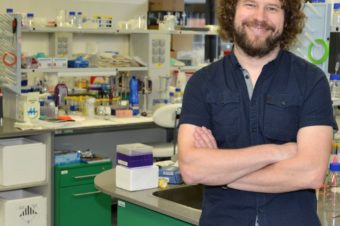The aim of this award is to increase the number of doctoral students who complete their studies in the standard study period, possibly extended by one year, with excellent results processed in their dissertation. The award should motivate students and their supervisors to successfully complete their studies in the shortest possible time and to prepare and process excellent research and dissertations.
This year, 40 students of the Faculty of Science received this award and 3 of them are from OFIŽ!:

Mgr. Lenka Radoňová, Ph.D. has been awarded for her excellent PhD thesis called Control Mechanisms of Chromosome Segregation During Early Development under supervision of assoc. prof. Martin Anger.
The work summarizes the molecular mechanisms that regulate cell division at the beginning of organism development. This period is characterized by the frequent occurrence of chromosome division errors, which leads to the formation of cells with the wrong number of chromosomes. Such cells threaten the further development of the embryo, and may either cause premature termination of fetal development or lead to the birth of an individual with severe developmental and mental disorders. Previous research has shown that the presence of cells with the wrong number of chromosomes in the embryo is the most common cause of fetal development in humans.
The results of Lenka Radoňová’s work contributed to the elucidation of the molecular mechanisms responsible for the inaccurate division of chromosomes in female germ cells and pointed to the fundamental differences in cell cycle control between germ and somatic cells.
Lenka Radoňová now continues her scientific career as a postdoc at National Institute of Environmental Health Sciences, USA.
Mgr. Stanislav Drápela, Ph.D. successfully defended his PhD thesis Synthetic Lethality in the Therapy of Advanced Prostate Cancer supervised by Dr. Karel Souček.
The dissertation summarizes the advances in the research of advanced prostate cancer. Using high-throughput multispectral flow cytometry, the team succeeded in defining a specific expression profile of surface molecules in chemoresistant prostate tumors, which could be used in the future for the development of drugs targeting chemotherapy-resistant tumor cells.
Using preclinical models of advanced prostate cancer, it has also been shown that inhibition of CHK1 kinase by the new inhibitor MU380 significantly enhances the effect of chemotherapy and leads to overcoming resistance to the cytostatic docetaxel.
The results of Stanislav Drápela can be the basis for increasing the effectiveness and reducing the side effects of the current treatment of advanced prostate cancer.
Stanislav Drápela now continues in his scientific journey at Moffitt Cancer Center, USA.


Mgr. Petra Paclíková, Ph.D. has been awarded for her excellent scientific results that were part of her PhD thesis Dishevelled Functional Analysis Using CRISPR/Cas9 Editing Technique supervised by prof. Vítězslav Bryja.
Dishevelled protein is a component of Wnt signaling pathway which is one of the key signaling pathways that cells use to communicate and function properly. Wnt signaling regulates the processes of cell differentiation, proliferation and migration, and its deregulation is the cause of a wide range of diseases, including various types of cancer. The Disheveled protein, which acts as a switch between the various cascades of Wnt signaling, integrates the signal received by the cell from the external environment and decides what other effectors will be activated in the cell. Using special CRISPR / Cas9 edited cell lines, Petra Paclíková and her colleagues mapped and described important functional parts of the Disheveled protein and their effect on the activation of individual branches of Wnt signaling.
Petra Paclíková still continues in the research of Dishevelled protein in Bryjalab.





